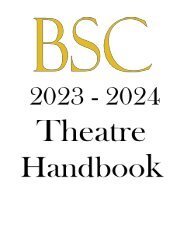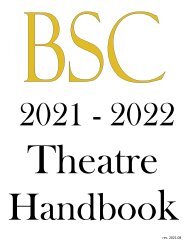2019-2020 BSC Catalog
You also want an ePaper? Increase the reach of your titles
YUMPU automatically turns print PDFs into web optimized ePapers that Google loves.
94 ACADEMIC PROGRAMS<br />
The Intercultural Leadership Summer Program at the European Study Center in<br />
Strasbourg, France, may be used to fulfill one of the designated course requirements.<br />
Contact the program director for additional information about this option.<br />
Upon enrollment in a leadership studies designated course, students must indicate to the<br />
professor at the beginning of the term that they intend to use the course in fulfillment of<br />
the DLS requirements, and should plan to complete a project or paper focused on<br />
leadership in order to earn credit towards the DLS program.<br />
Mathematical Finance<br />
Bachelor of Science<br />
Jeffrey T. Barton, Paul A. Cleveland, Douglas A. Riley, Sara H. Robicheaux, Kathleen<br />
Greer Rossmann, Guangjun Qu<br />
Mathematical finance is the interdisciplinary study of financial markets. The major<br />
employs economic theory to evaluate how time, risk, opportunity costs, and information<br />
can create incentives for a particular decision; develops advanced mathematical tools<br />
necessary to study and understand financial markets; and provides a foundation in<br />
business finance. A major in mathematical finance provides an academic framework to<br />
explore the role of financial markets and intermediaries in the allocation (and<br />
misallocation) of capital. Among the topics studied in mathematical finance are financial<br />
markets, banks and other financial intermediaries, asset valuation, portfolio allocation,<br />
regulation and corporate governance. Students who enjoy abstract economics analysis,<br />
applied financial analysis, and advanced mathematics will find the major interesting and<br />
challenging.<br />
Upon completion of the mathematical finance major, students will be able to<br />
• use mathematical methods to solve quantitative problems<br />
• engage in observation and inference from data and apply statistical methods<br />
• present a coherent explanation of their work to a group of peers<br />
The major requires a set of core courses designed to provide a foundation in mathematics,<br />
economics, accounting, and finance. Following this core, students individualize their<br />
major by choosing one of two tracks: financial economics or mathematics.<br />
The financial economics track offers students a deeper knowledge of economics and<br />
finance. This track involves intensive data analysis and applied economics. This track is<br />
recommended for students interested in private and public sector careers.<br />
The mathematics track provides students with a grounding in economic theory<br />
comparable to that provided by the general economics major and exposes students to<br />
rigorous and extensive training in mathematics. This track is recommended for students<br />
contemplating graduate studies in economics or finance, or those interested in careers that<br />
require strong quantitative skills or professional designations from organizations such as<br />
Birmingham-Southern College <strong>Catalog</strong> <strong>2019</strong>-<strong>2020</strong>






![2023-2024 BSC Catalog Updated_UG ONLY_FINAL[82]](https://img.yumpu.com/68414854/1/178x260/2023-2024-bsc-catalog-updated-ug-only-final82.jpg?quality=85)










